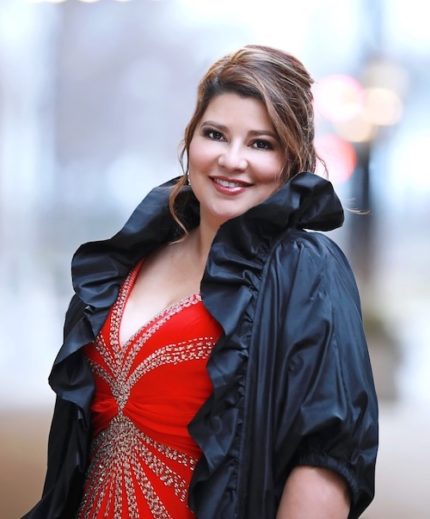New song-cycle spotlights Chicago Ensemble’s wide-ranging season finale

Maintaining its track record of serving up varied chamber music programs studded with unexpected discoveries, the Chicago Ensemble spotlighted a set of 20th-century rarities in the belated finale to its 45th season on Monday evening. (Originally slated for June, these performances were rescheduled due to a case of Covid.)
The performance in Buchanan Hall at Fourth Presbyterian Church opened with a bit of familiar repertoire, introducing the evening’s players in two cantata arias by Bach: “Süsser Trost, mein Jesus kömmt” from Cantata No. 151, and Cantata No. 21’s “Seufzer, Thränem, Kummer, Noth.”
Soprano Michelle Areyzaga sang with a round, clear tone throughout her register, a few pitchy high notes apart. Flutist Yukie Ota and oboist Ricardo Castañeda, who soloed in wind obbligatos in the cantatas, were capable melodic foils, yet a certain reticence from pianist Gerald Rizzer softened the pacing overall.
Areyzaga and artistic director Rizzer fared similarly in a selection of canzonettas by Haydn. A product of the composer’s London sojourn in 1791-92 and sung in English (texts by the aristocrat poet Anne Hunter), the songs were a fitting match for the soprano. Areyzago ably embodied the coy narrator in the standout “Piercing Eyes,” and more pinched high notes aside, was captivating in the haunting, proto-Schubertian “The Wanderer” and “The Spirit’s Song.”
Taking center stage in the more recent portion of the set, the woodwind soloists excelled in the Trio by Jean-Michel Demase. Though he was largely overlooked for his adherence to tonalism throughout the late 20th century, Damase nevertheless produced a robust corpus of exquisite chamber music that favors woodwinds in its instrumentation.
This Trio, which dates to 1962, is indeed replete with elegantly lyrical wind writing, which is initially obfuscated by a dissonant, clangorous motif that buttresses the first and fourth movements. Even in these knotty passages, Ota and Castañeda demonstrated precise intonation and seamless balance, especially in expansive stretches of gilded melody that are the tentpoles of this work. Despite pristine delivery of these sunlit passages, the interstitial development sections could have used greater drama and more sharply drawn contrasts.
After intermission, the winds returned to the stage, sans Rizzer, to present a neoclassical gem, the Duo by Argentine composer Alberto Ginastera. The piece’s opening Sonata section also evinced the chemistry between Ota and Castañeda, who succeeded on account of their rock-solid rhythm and nuanced dynamic shadings. The pair took tasteful liberties in tempo and pacing to great effect.
Even in the concert’s more pedestrian moments, Yukie Ota proved the standout performer of the evening. Whether illuminating a lead voice or weaving sensitive counterpoint, the flutist brought her burnished tone, rhythmic incisiveness, and thoughtful interpretation to every element of the music; this performance assured that she is a rising artist to watch.
The program’s keystone work was The Gorgeous Nothings, a song cycle by German-born, Kansas-based composer Ingrid Stölzel. Scored for soprano, flute, oboe, and piano, the piece was one of 24 winners of the 2017 Discover America award, the Chicago Ensemble’s flagship prize dedicated to contemporary American chamber music. The work has since been recorded, but this concert marked the Ensemble’s overdue first performance of the cycle.
The Gorgeous Nothings takes the writings of the essential American writer Emily Dickinson as its source material, though Stölzel’s text focuses not on the poet’s better-known lodestars but on short fragments and marginalia of her so-called envelope writings. The melancholic nature of these writings, which gravitate toward familiar Dickensonian subjects of mortality and spirituality, are underpinned by a similarly introspective setting of mostly consonant harmonies and repetitive rhythmic structures.
Areyzaga’s luminous soprano plumbed the depths of the text, alternating between plaintive folkishness in “Clogged Only With Music” to soaring, operatic grandeur in “It Is Very Still.” The winds provided balanced support throughout and Rizzer’s subtle touch was perfectly suited to the indigo-hued accompaniment. Unfortunately, the performance was marred by clumsy, uncoordinated entrances, especially in the stuttering fourth song, “The Little Sentences,” the work’s weakest movement.
If the surprising shortcomings detracted from the performances of the previous work, the instrumentalists’ reading of Eugene Goossens’ Pastorale and Harlequinade provided a palliative. Ota, Castañeda, and Rizzer were at their most cohesive in this enchanting diptych from 1925; the woodwinds cast their rustic, pentatonic melodies in silver, while Rizzer — performing here with the conviction and confidence of a collaborative equal — perfumed them with clouds of plush, Ravelian harmony.
The program will be repeated 7:30 p.m. Friday at International House in Hyde Park. thechicagoensemble.org
Posted in Uncategorized




